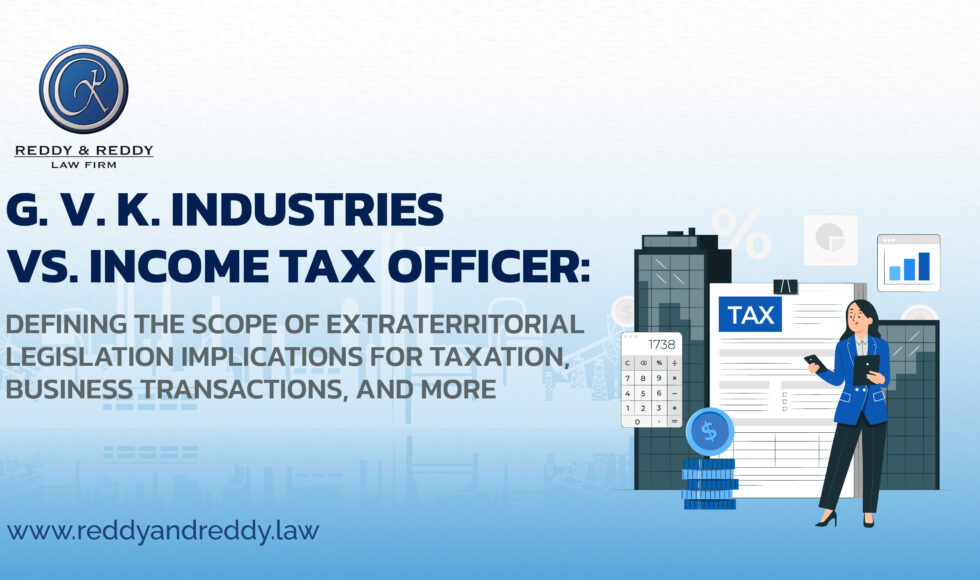In a globally connected economy, the extent to which national laws can influence international transactions is a significant legal question. Under the Indian Constitution, Article 245 governs the extent of laws made by the Parliament and state legislatures. It specifies that the Parliament can make laws for the entire territory of India, while state legislatures can legislate for their respective states. However, an important exception in clause (2) of Article 245 indicates that a law made by Parliament cannot be deemed invalid solely because it applies outside the Indian territory.
The case arose when G.V.K. Industries Ltd., an Andhra Pradesh-based company, sought consultancy services from a Swiss firm for a gas power project. The crux of the legal dispute was the applicability of Indian tax laws to fees paid for services rendered outside India. This seemingly straightforward tax matter escalated into a constitutional question about the extent of Parliament’s legislative authority.
At the heart of the debate was Article 245 of the Constitution, which outlines the territorial extent of laws made by Parliament and state legislatures. The court grappled with two critical questions:
- Is Parliament constitutionally restricted from legislating on extraterritorial aspects?
- Does Parliament have the power to make laws regarding extraterritorial matters or territories outside India?
The Supreme Court’s verdict was nuanced and far-reaching. It held that while Parliament does have the power to enact laws with extraterritorial application, this power is not absolute. The court emphasised that such laws must have a nexus with India and should serve the interests of its people.
Facts of the Case
V. K. Industries Ltd., incorporated in Andhra Pradesh, sought to develop a gas power project. To facilitate this, they hired ABB-Projects & Trade Finance International Ltd. from Zurich, Switzerland, for consultancy services, as they needed help finding suitable experts in India. When paying the ‘success fee’ for these services, the company approached the Income Tax Officer (ITO) to issue a ‘No Objection Certificate’ to deduct the sum without facing tax liability, arguing that ABB had no business connection in India.
Proceedings and Arguments
The ITO rejected G. V. K. Industries’ application, stating that the consultancy fees were taxable under Section 9(1)(i) and Section 9(1)(vii)(b) of the Income Tax Act, 1961. Upon appeal, the Commissioner of Income Tax initially granted relief but later reversed the decision, mandating tax payment before issuing the certificate. The High Court of Andhra Pradesh upheld this decision, leading to a civil appeal before the Supreme Court.
The petitioners contended that Parliament lacked the power to enact extraterritorial laws unless they benefited India. They cited Electronics Corporation of India Ltd. vs. Commissioner of Income Tax (1989) to argue that laws under Article 245 cannot be invalidated solely for being extraterritorial. The respondents argued that the narrow interpretation of Article 245 in the ECIL case limited Parliament’s power and that laws with extraterritorial applications, if benefiting India, should be valid.
Supreme Court Judgement
The Supreme Court held that while the Parliament could enact extraterritorial laws, such laws must benefit India or its people. The Court emphasised that the Parliament’s role is to serve India’s interests, and any extraterritorial legislation without a direct nexus to Indian interests would be ultra vires of Article 245. The judgement clarified that Parliament’s power is not unfettered and must align with Indian welfare and territorial sovereignty.
Key Takeaways from the Judgement
- Nexus Requirement: The court established that for Parliament to legislate on extraterritorial matters, there must be a clear connection to India or its interests. This principle ensures that laws are not arbitrarily extended beyond national boundaries.
- The benefit to India: Any law with extraterritorial reach must be demonstrably beneficial to India or its citizens. This criterion aligns legislative power with national welfare and interests.
- Constitutional Limits: The judgement reaffirmed that parliamentary power, while extensive, is not unlimited. It must be exercised within the constitutional framework and for the welfare of Indian citizens.
- Interpretation of Article 245: The court provided a broader interpretation of Article 245(1), expanding Parliament’s legislative scope while maintaining constitutional checks.
- Sovereignty in Modern Context: The judgement touched upon the concept of sovereignty in the contemporary world, acknowledging the need for certain extraordinary powers while emphasising their exercise within constitutional bounds.
Implications for Indian Law and Policy
This judgement has significant implications for Indian legislation, particularly in areas like international taxation, cross-border transactions, and global business operations. It provides a framework for assessing the validity of laws that have extraterritorial impact, ensuring they align with national interests and constitutional principles.
For businesses operating in India or engaging with Indian entities, this decision underscores the importance of understanding the potential reach of Indian laws beyond territorial boundaries. It also highlights the need for careful consideration of tax implications in international transactions involving Indian parties.
The G.V.K. Industries case also reflects India’s evolving position in the global economy. As Indian businesses expand globally and foreign entities increase their presence in India, the need for clear legal principles governing cross-border activities becomes crucial. This judgement provides a balanced approach, allowing for the necessary extraterritorial application of laws while safeguarding against overreach.
Moreover, the case sets a precedent for how Indian courts might interpret similar issues in the future. It establishes a test of ‘nexus and benefit’ that can guide future legislation and judicial decisions on matters with international implications.
The G.V.K. Industries Ltd. vs. Income Tax Officer case is pivotal in Indian constitutional law. It strikes a delicate balance between empowering Parliament to address complex international issues and maintaining the constitutional ethos of limited government power.
As India continues to integrate with the global economy, this judgement provides a robust framework for navigating the challenges of legislating in an interconnected world. It ensures that while India can protect its interests and those of its citizens beyond its borders, it does so within the confines of constitutional propriety and international norms.
For legal practitioners, policymakers, and businesses alike, this case serves as a crucial reference point in understanding the scope and limits of Indian law in an increasingly globalised context. It reinforces the principle that even as laws adapt to new realities, they must remain rooted in the fundamental tenets of the Constitution and the welfare of the nation’s people.

